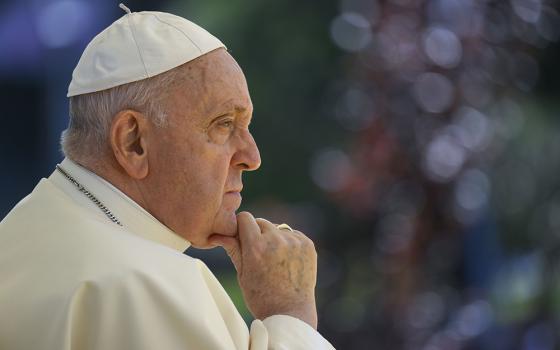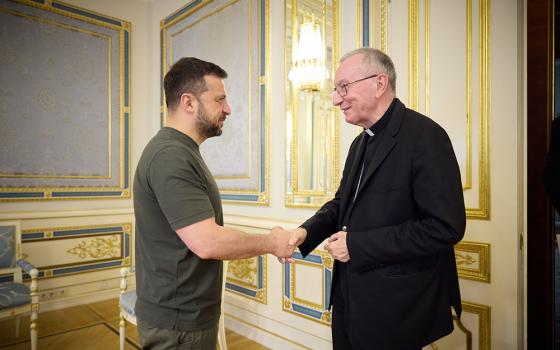The issue of religious liberty has seemingly fallen by the wayside this election. Once the Pew survey in July showed that the "Fortnight for Freedom" has not made much of an impression – only 22% of Catholics reported having heard "a lot" about the issue - pollsters stopped inquiring. And, as in most elections, the economy dominates all other issues. As well, as the negotiations over the HHS mandate, the most prominent focus of the religious liberty debate, have gotten nowhere, both sides seem content to let the courts handle the issue.
There is an irony here, one that was on display at yesterday's Red Mass. Six Supreme Court justices attended, and they arrange themselves in the pews by seniority, with the exception, of course, of the Chief Justice. So, in the front row, there was Justice Scalia, with Chief Justice Roberts and Justice Kennedy. In the pew behind were Justices Thomas, Breyer and Kagan. I wondered how many people were thinking what I was thinking – there is Scalia, author of Employment Division v. Smith, the decision that stands in the way of the Catholic Church winning in the courts, and behind him, Justice Kagan, who is not a Catholic, who was appointed to the court by President Obama, who joined the absent Justice Alito in a concurring opinion in Hosanna-Tabor v. EEOC earlier this year that would seem to put her on the side of the Church should the HHS mandate get to the high court. Kagan was attentive throughout the Mass which, blessedly, had a real sermon, not a political one, from Archbishop Timothy Broglio. So, the irony is this: Would a moderate, left-of-center jurist appointed by Obama be more likely or less likely than a hard edged conservative jurist appointed by Romney to side with the Church on the issue of religious liberty? Even if you think you know the answer, it is far from self-evident.
The court's First Amendment jurisprudence has been a mess for some time, and it is difficult to see how it will evolve, not least because while the justices like to comfort themselves that they are dealing with high principles, I think it is inescapably obvious that the facts of a case help determine the outcome. Had Justice Scalia not been dealing with a few peyote-smoking Native Americans in Smith, but with the demands of Holy Mother Church, I wonder if he would have reached the conclusion he did.
Of course, not all religious liberty battles will be fought in the courts. Indeed, the most significant change in church-state relations in the past fifteen years has been the development of both a legal and an administrative architecture for faith-based initiatives, and that change has been a huge success for champions of religious freedom. Our faith-based agencies receive a great deal of funding from the federal government, and this allows them to do what they have always done, care for the poor, without also having to spend tons of time raising money. The contribution faith-based agencies make is greater than the material benefits they bring to people. There are many sources for seemingly endemic problems like poverty, and some of those sources are personal, spiritual, cultural and, just so, not susceptible to resolution by a large government program. All programs need funding, but some solutions require more than funding. Some people need help, but others need healing, and the churches are simply better attuned to the need for healing precisely because of their own inner constitution.
This year, as upsetting as the HHS mandate issue was and is, it was a different decision by HHS not to renew a contract with the USCCB to assist the victims of human trafficking that may prove more worrisome. To the extent that the decision was based on the Church's unwillingness to provide contraceptive services to victims, HHS over-stepped and over-stepped badly. One of the reasons faith-based agencies work so well is because they are run by people who share a common mission, something deeper than an official commitment to "excellence" or any other contentless noun, they are rooted in traditions that touch the deepest parts of the human soul. It is like grief counselors: They may be able to deal with the effects of grief, but you need someone with a religious sensibility to get to the source of grief, that place where we must decide existential questions: what is justice? What can I expect from life? Those deeper questions are not the stuff of Institute of Medicine studies or HHS regulations, but they are completely pertinent to a victim of human trafficking. Does a victim of human trafficking need the pill? Or does she need someone who understands that there are tragedies in life that defy explanation, that suffering can become redemptive, and that there is a hope beyond the evils of this world?
Most Catholics whose commitment to social justice leads them to vote with the Democrats need to be a bit more pushy within the counsels of the party they have chosen. I do not believe the President hates the Church, nor do I believe he intends to make war on us. But, in both these HHS decisions, his administration took the counsel of groups that would like to minimize the Church's role in society, groups that resist the faith-based initiatives started by President Bush and continued and expanded and improved by President Obama. Call it the NARAL-ACLU wing of the Democratic Party. I believe they are dangerous not only to the Church but to the best interests of the Democratic Party. That said, I also doubt the Senate would confirm a nominee whose ideology was too close to the NARAL-ACLU orthodoxy. So, my message to Democratic Catholics – be pushy, make the White House know you don't like these attempts to sideline the Church's ministries or efforts to make them adopt a secular agenda as the price of admission to the public square.
On the other hand, the Republican Party has abandoned even the pretense of a conservatism that is compassionate. The language of the Tea Party is not the language of compassion. And, their commitment to juridical originalism is not particularly comforting when it comes to the Court. I am sure that key figures in a Romney administration would be more likely to take a call from a bishop and more likely to act on the request. But, that is not the same thing as a commitment to religious liberty and given the anti-Muslim fervor that animates much of the GOP base, I would fear greatly for the religious freedom of our Muslim brothers and sisters. My message to Republican Catholics – help your party reclaim some of the compassionate conservatism that has been lost, and stand up for your Muslim brothers and sisters.
The issue is religious liberty not a fake issue and it is not going away. It will never go away. It is part of the tensile chords in our national life, our political life, our social life, our cultural life, our legal life. The challenges to religious liberty are different in the U.S. from what they are in other parts of the globe, and we Catholics especially should commit ourselves to vindicating the rights of those whose religious convictions endanger them gravely. But, we can't help those Nigerian Catholics whose churches are bombed by caving to government mandates here at home. The issue of religious liberty is trickier than many people think, including many bishops. Some of what has been said by certain prelates on the issue has been embarrassing in its ignorance of the American founding. But, the bishops are right to raise the issue and anyone who thinks that our culture benefits from the leaven of the Church should pay attention to it.




